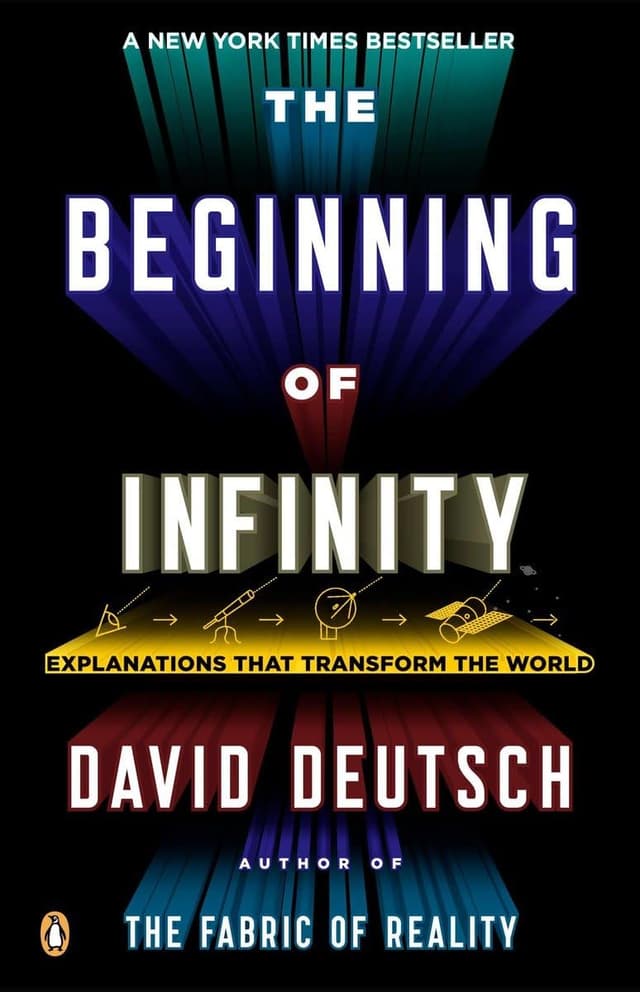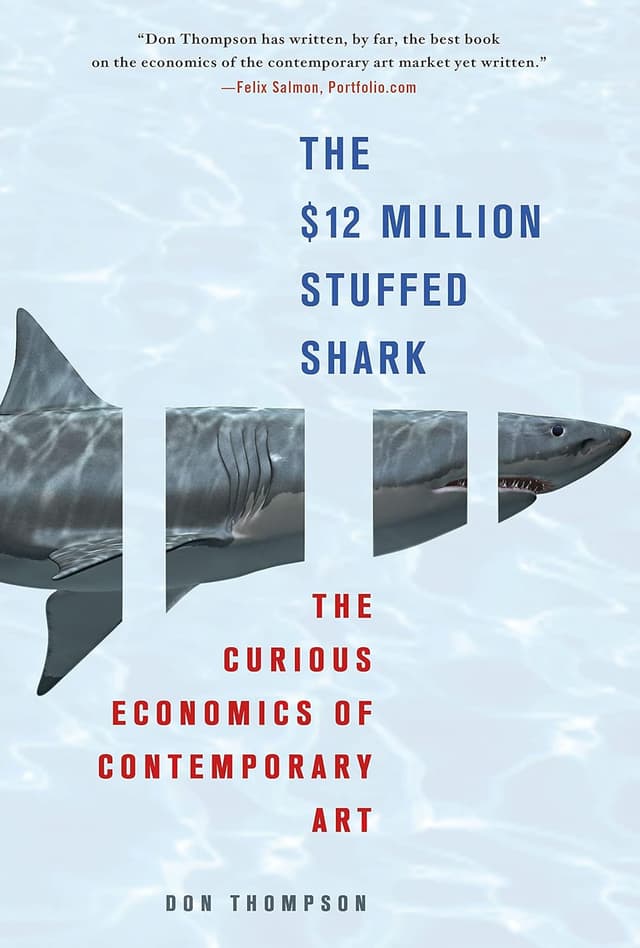Michael Sharon | August 3, 2020
Why is this interesting? The Monday Media Diet with Michael Sharon
On Africa, the next wave of coffee, and being seduced by NYC
Recommended Products

A book by David Deutsch that explores the power of explanations and the optimism that the universe is infinitely explorable and solvable.

A book by Geoffrey West about how various entities scale, from animals to cities, and how this scaling affects or doesn't affect relationships and properties.

A book that delves into the contemporary art world, exploring the economics and the value of art in today's market.
Michael Sharon (MS) is a good friend of WITI, since his time fresh out of NYU’s ITP program. He worked on one of the most interesting location-aware social platforms, Socialight, back in the day where we all coveted that Nokia N95 phone that had GPS. He’s always been a voracious city explorer and optimistic technologist and the world has zoomed forward since we first met, Michael has remained just as interesting and we’re happy to have him here on the page. -Colin (CJN)

Tell us about yourself.
I'm currently the co-founder + CEO at Taika - a startup that makes perfectly calibrated, outrageously delicious coffee blended with adaptogens to make you feel awake, aware and inspired. In past lives I have also been at some point or been competent enough to play on TV - a technology entrepreneur, angel investor, product leader, programmer, musician, media artist and writer. Good thing most of those require zero qualifications.
Right before doing this whole CPG startup thing, I spent two and a half years crisscrossing the globe after saying "yes" a lot to random suggestions my friends made. This resulted in, amongst other things, exploring the world's only desert with freshwater lagoons, spending 10 days in an unincorporated area of the Arctic searching for polar bears with some spectacular photographers, visiting The Floating Piers - one of the more simultaneously ethereal and visceral Christo + Jean Claude works, visiting actual fantasy landscapes and other assorted adventures.
Before that I worked at Facebook for ~8 years. Before Facebook, I was an adjunct professor at New York University and Columbia University and co-founder of Socialight - one of the earliest mobile location apps.
I was born in Israel, grew up in South Africa and ended up moving to NYC in 2002 because I was both obsessed with the city and the Interactive Telecommunications Program at NYU's Tisch School of the Arts gave me a scholarship. This ended up imbuing me with an unreasonable and unwarranted degree of confidence and the ability to ditch my life as a truly awful photographer and only somewhat shoddy writer in South Africa for the glitz and glamour of being a foreign student in New York City.
Describe your media diet.
Omnivorous and varied. I will consume most things digital and occasional print publications that I still subscribe to (New Yorker, Wired and the Economist mostly) or that I pick up when I'm traveling (usually Monocle or Wallpaper). I subscribe to a fair number of newsletters (this one included) but find myself regularly reading Matt Levine's Money Stuff, Benedict Evans' newsletter, WITI, Om Malik's newsletter, the Skimm and a handful of industry specific ones like Lean Luxe, 2PM, Peter Attia's newsletter and Fitt Insider.
I do enjoy the news but have tried to stay away from aimlessly browsing mainstream news publications or headlines for the last few years which has definitely given me a lot of time back and significantly reduced my level of daily angst.
One delightful habit that a friend turned me on to a few years ago is always keeping a stack of long reads (usually 20-40 mins) from publications like Jacobin, Pro Publica, The New Yorker and other in my Pocket so that whenever I have some free time somewhere, I can pick up a fascinating deep dive piece instead of being distracted by the headline du jour.
I've also caught myself doomscrolling a bit lately, Twitter's current algorithms seem almost designed to feed one with soaking mists of outrage that are carefully metered to last until just below the fold where the next enraging post lies sweetly in wait.
Guilty pleasures include following The Onion on every single social platform they choose to publish on - but mostly Instagram these days where they have been consistently delivering some hard hitting work. TikTok has also been a guilty pleasure lately, mostly for doggie videos and weirdly compelling memes.
Podcasts are an essential feature of any trip that I take in my car. I listen to a lot of more tech focused stuff like Reply All, How I Built This, Exponent and The Critical Path as well as whatever is on the a16z Podcast but recently branched out into Against The Rules with Michael Lewis, Tim Ferris, How Long Gone, Pod Save America and The Doctor's Farmacy. True story: a few days ago I had to completely nuke my phone after attempting to delete 23GB of stored podcasts that had left me out of space. So, caveat emptor. Maybe I need to listen more like my ex always told me.
What’s the last great book you read?
The Beginning of Infinity by David Deutsch. It's one of the most relentlessly optimistic books I've ever read and I can say with 100% certainty that it completely changed the way I think about many things. It took me a little while to get going but once I got stuck in it was a dazzling tour of the universe inside a first rate genius mind. The central premise of the book - that we can do anything if we have the right explanations is a celebration of the creativity of humans who can then use explanations to do anything (the "infinity" of the title). One of the phrases that really stuck with me is his wonderfully succinct theory of optimism - "Problems are inevitable. Problems are soluble."
What are you reading now?
Scale by Geoffrey West. It's another one of these big concept pop-sci books that everybody seems to have read before me, but I kinda enjoy being late to the party on these things. It's about how relationships change or stay constant between many different kinds of things (animals, cities, companies) as they scale - e.g the number of heartbeats in a mammal's life stays roughly constant even as size increases.
I'm also starting The $12M Stuffed Shark which looks to be a great primer on the craziness of the contemporary art world.
What’s your reading strategy when you pick up a print copy of your favorite publication?
I love starting at the beginning, browsing through all the ads because those are what really help you realize that you're holding a big stack of glossy, colored dead tree particles. Once I've gotten about halfway, I'll page through the rest and decide if I'd like to continue or put it down and move on. This is my preferred strategy for reading the New Yorker because I love all the reviews in Goings On About Town and then will generally read up to Shouts & Murmurs before I decide to whether I'm in for the rest of it or not.
Who should everyone be reading that they’re not?
Matt Levine - his Money Stuff newsletter is always an entertaining and engrossing read.
What is the best non-famous app you love on your phone?
1Password. Seriously. I love it. Love love love it. It's the first app I set up on any new thing I buy (iPhone, iPad, laptop etc). I keep everything in there. Like everything. It's encrypted and lets you throw in files and write notes and best of all, you can generate random 20 character passwords for every site you use and DGAF when they inevitably get hacked. No guarantees on surviving things like the latest Twitter hack tho. That sounded nasty.
I originally started using it after the Gawker hack (remember that) when a friend emailed me the username & password that I reused on everything. I'm now that annoyingly anal friend that will go and force you to install it on your device and then follow up with you regularly to make sure you're actually using it.
Plane or train?
Metal bird hundo p. I love the Shinkansen in Japan and the trains in Europe but it's just so difficult to get decent travel experiences with trains in the US. The whole ritual of air travel is also something that I really enjoy - I'm one of those people that gets to the airport ahead of time so I can always take a leisurely stroll through the terminal to the lounge. Posting up in the lounge with a drink and having some time to ease into the next few hours of travel is a key part of my pre-flight ritual. If it's a new airport or country I find myself in, I love browsing whatever unique curios, tchotchkes or random merchandise is on offer. You can learn a lot about a culture from the artifacts they think should be collected by visitors for displaying on their mantelpieces at home.
What is one place everyone should visit?
It's hard to tell everybody to visit a single place in their lifetime so I'll settle for Africa - the massive continent where I grew up. While I don't want to perpetuate any stereotypes that Africa is all the same - every single one of the countries that I have managed to visit (out of 54 total) have all been wildly different - but it doesn't really matter which country you start with to get the bug. Rwanda has spectacular coffee, gorilla tours and the Genocide Museum which is a must see. Kenya and Tanzania each have phenomenal people, terrain and wildlife. Mozambique is spectacular, especially if you skip Maputo and head to some of the islands off the coast. South Africa is fantastic too - but it's "Africa For Dummies" - the country is highly developed, super easy to travel through and will feel really familiar to anyone coming from the US / UK / Europe.
Tell us the story of a rabbit hole you fell deep into.
It started innocently enough, casually browsing Wikipedia reading up on the history of tea at 1am as one does. Seriously. You think it's this really lame dried leaf that is a bit more civilized and genteel than coffee, but you really know nothing of the dark and sordid history of the tea plant and how it still influences current geopolitics on a massive scale today. It turns out this is one of the most insanely contested and revolutionary plants of all time - inducing massively bad behaviour from a number of different people, companies, states, megacorporations, company-states, and other players in history. If you think I'm kidding, I invite you to read either the Wikipedia entry on tea right up until the First and Second Opium Wars with China where Great Britain went to war with the Chinese because they were upset about the British supplied opium flooding their cities. Truth is definitely stranger than fiction.
Thanks for reading,
Noah (NRB) & Colin (CJN) & Michael (MS)
—
Why is this interesting? is a daily email from Noah Brier & Colin Nagy (and friends!) about interesting things. If you’ve enjoyed this edition, please consider forwarding it to a friend. If you’re reading it for the first time, consider subscribing (it’s free!).